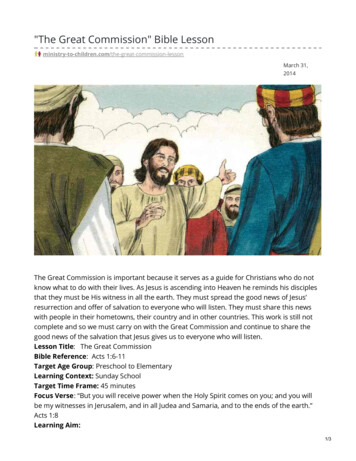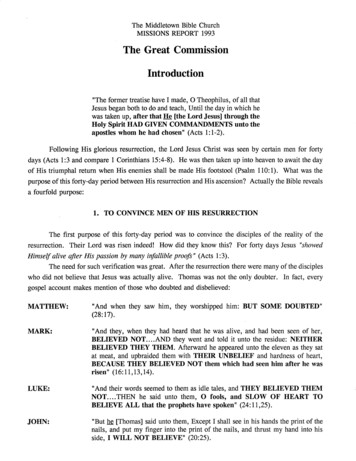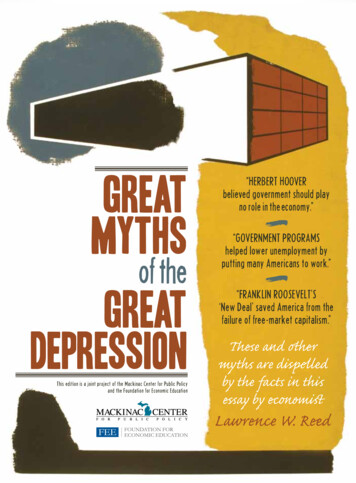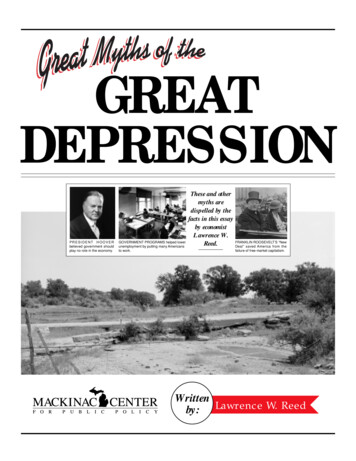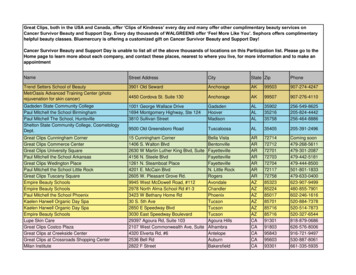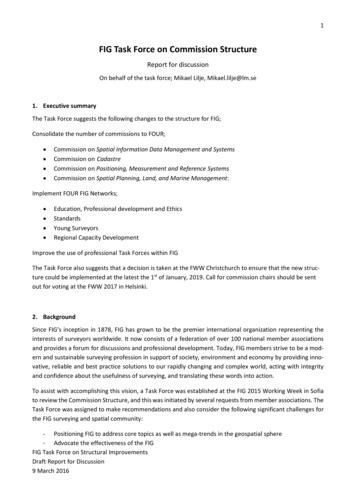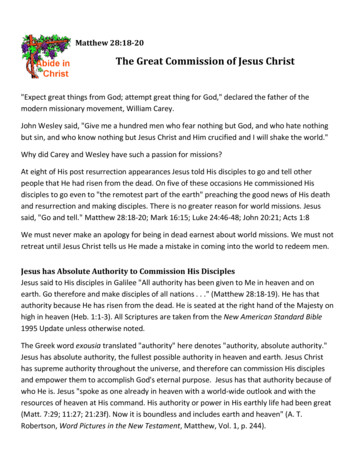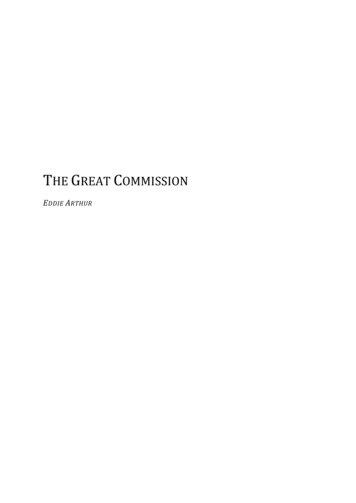
Transcription
THE GREAT COMMISSIONE DDIE A RTHUR
This ebook consists of a compilation of posts from my blog (kouya.net) and is available fordistribution free of charge. My wife and I have worked with Wycliffe Bible Translators for overtwenty five years in a variety of translation and leadership roles. This hands-on experience ofmission has, undoubtedly, influenced my understanding of the Jesus commission to the church.I write as an introvert who is committed to the values of Christian community and as a veryreluctant evangelist who believes that witnessing to Christ is one of our highest callings.My aim is to eventually publish this booklet, as part of a compilation of my writings on Bible andMission. Your thoughts and advice on this would be more than welcome.Unless stated otherwise, Bible quotations are from the New Living Translation.If you find this booklet helpful, it might be appropriate to make a donation to Wycliffe BibleTranslators (wycliffe.org.uk).
INTRODUCTIONWhen Jesus was about to leave the earth, he gathered his disciples together for one last time, tospeak to them. The world was about to change dramatically for the disciples, Jesus would nolonger be with them and they would be the ones required to carry on his work. There, on amountainside, Jesus outlined to them exactly how he wanted them to act in the future. Matthewcaptured Jesus words at the very end of his Gospel, in what has become known as "The GreatCommission" (Matthew 28:18-20).Jesus came and told his disciples, “I have been given all authority in heaven and on earth.Therefore, go and make disciples of all the nations, baptizing them in the name of the Father andthe Son and the Holy Spirit. Teach these new disciples to obey all the commands I have given you.And be sure of this: I am with you always, even to the end of the age.”Luke also recorded a version of these words at the opening of the Acts of the Apostles (Acts 1:8),but his version tends to be referred to less frequently than Matthew's.These are the last words that the risen Jesus spoke to his assembled disciples and as Christianswe have to take them very seriously. Over the years I have heard them referred to in manydifferent ways; including "God's Marching Orders to the Church" and "The Church's PrimeDirective". Clearly, Jesus saw this command to make disciples as being very important, which iswhy he delivered it in in such a dramatic situation. However, we need to remember that he didnot consider the "Great Commission" to be the most important commandment, or even thesecond most important, come to that (Matthew 22:37-39). In many ways, the Great Commissionis no more than an outworking of the greater commands to love God and our neighbours.In many circles, the Great Commission has taken on a huge significance and importance. The lastfew verses of Matthew are among the most quoted parts of the Gospels and the phrase 'GreatCommission' has become talismanic, describing certain types of church or Christian. More thanone mission agency in the US has their headquarters located on 'Great Commission Road' orGreat Commission Way'. However, I believe that it is one of those parts of the Bible wherefamiliarity has bred, if not contempt, then complacency. Jesus’ words feel so familiar and theircall on our lives seem so obvious, that we sometimes don’t stop to ask whether we have reallyunderstood what is being said.This booklet takes a fresh look at Jesus words as recorded by Matthew and Luke and bringsthem to life for the Church in the early part of the 21st Century.COMMISSION IMPOSSIBLEYou don't have to look very far in Christian books or on the internet to find plans to 'accomplishthe Great Commission'. There is a vast body of literature explaining how we can 'finish the task'or words to that effect. But, how realistic is this?“All authority in heaven and on earth has been given to me. Go therefore and make disciples of allnations, baptizing them in the name of the Father and of the Son and of the Holy Spirit, teachingthem to observe all that I have commanded you. And behold, I am with you always, to the end ofthe age.” (Matthew 28:18-20 ESV)
The command in Matthew 28 is to make disciples of all nations. It is not to preach to all nations;it is not to establish churches in all nations or to translate the Scriptures into every languagethat needs it. Making disciples is a continuous job. No one is ever fully a disciple, and even whenthe Gospel is well established in a country it doesn’t mean that the nation is full of disciples. TheChristian message has been part of the British national culture for over 1,500 years, but anyonewho thinks that this nation has no further need of disciple-making just hasn’t been here for awhile.There are some tasks which can be seen as projects, they have a starting point and an end point.Other jobs are not like that; they may have a starting point, but they have to be carried on all thetime because there is always something new about them. The Great Commission is like thelatter, every generation is faced with a whole load of new people who need to become disciplesof Jesus. Nations which once rejoiced in millions of disciples turn away from God and need to bereached all over again. The Great Commission is not a one-off task that can one day be checkedoff the Church’s to-do list, it is our ongoing mission which is being continually renewed as wehave the amazing privilege of making disciples anew across the whole of geography and history.In essence, I believe that our response to the missional call in the Bible is bound up in ourposture before God and before the world. It is not a task on our to-do list that can be finished sothat we can move on to something else.THE MANNER OF MISSIONAs Christians, we can get very hung up on activities; on doing stuff. There are literally hundredsof plans for world evangelisation and strategies to reach all of the nations for Christ. Don’t getme wrong, I’m not saying that doing stuff and making plans is wrong, but the way in which wedo things can often be far more important than the actual thing we do. You can sweep a floor tothe glory of God and you can preach a sermon to your own glorification: it all depends on yourattitude.This is why I believe that John 20:21 needs to be taken as the key text for mission at our point inhistory.As the Father has sent me, so I am sending you. (NLT)This verse doesn’t tell us what Jesus is sending us to do (make disciples, bear witness to him),but it does tell us how he is sending us. He is sending us in the same way that the Father senthim. Obviously, there is far more in this simple phrase than can be covered in a short a shortarticle, but I’d like to highlight three (related) ways in which the Father sent Jesus and in whichJesus sends us.Humility: the Son of God, who was intimately involved in every aspect of creation, came toearth as baby and was laid in a manger. He lived the life of a wandering teacher without wealthor status and was eventually executed as a common criminal. He befriended outcasts and themarginalised and was routinely shunned by people in authority and influence. Even in histeaching he did not push his own agenda, but spoke the words given to him by his Father.And this is how Jesus sends us out into the world: as humble servants, not as rulers andconquerors. We are not sent to build Empires or to extend the reach of our denominations or
our personal projects – we are sent to serve and to proclaim the Good News of Jesus. It is a sadfact that the message of Jesus has been distorted around the globe because missionaries havetended to come from the rich and powerful Western nations. This means that the message of thehumble, suffering servant has come tied up with the trappings of economic and political power.We need to find ways to decouple the Gospel of Jesus from the cultural baggage that so oftencomes attached to it and we need to learn to be servants as Jesus was.Sacrifice: Jesus was sent to give himself for us. The whole of his life, culminating in hisappalling death, was a demonstration of his love and sacrifice for us. He did not retain thecomfort, the majesty, the position or ultimately the life which was rightly his: he gave them allup freely for us.Mission is a call to sacrifice ourselves for Jesus. It involves giving up comfort, status, time,money – everything. Whether we are called as church-planting missionaries to Timbuctoo or asschool teachers in Tottenham, God calls us to lay our lives on the line for him. There are times ofgreat joy as we follow God which make all the sacrifices worthwhile. But there are times when itis hard, tough and seems to lead nowhere – but our call is to stick with it and to continue tofollow.Triumph: Jesus came in triumph, but it was a strange upside-down sort of triumph. His cry onthe cross “it is finished” had an element of triumph and victory – the sense of a difficult jobaccomplished against all the odds.There is a triumph in mission too, but it isn’t found in the spectacular pronouncements of the TVpreachers or the building of ecclesiastic or mission empires. Mission triumph is found in HenryMartyn burning out for God in Central Asia bringing the Scriptures to Muslim peoples. Christiantriumph is seen in the quiet life of Liang, a Chinese believer who helped plant a Church amongthe Li people on the Chinese island of Hunan, despite the fact that the Li had martyred herhusband just a few weeks earlier. Jesus sends us out in the same way that he was sent out andvictory is only won at a price.WHAT DID JESUS SAY?If we are going to discuss the Great Commission we need to spend a few minutes consideringwhat exactly the commission is. Now, this may sound obvious, most people would say that thecommission consists of Jesus’ words in Matthew 28:18,20:Jesus came and told his disciples, “I have been given all authority in heaven and on earth.Therefore, go and make disciples of all the nations, baptizing them in the name of the Father andthe Son and the Holy Spirit. Teach these new disciples to obey all the commands I have given you.And be sure of this: I am with you always, even to the end of the age.”So far so good, most people wouldn’t argue with this. However, when Luke records the sameevent, he has Jesus saying something slightly different (Acts 1:8):But you will receive power when the Holy Spirit comes upon you. And you will be my witnesses,telling people about me everywhere—in Jerusalem, throughout Judea, in Samaria, and to the endsof the earth.”
So which of these did Jesus say?Well, one approach would be to suggest that Jesus actually gave two slightly differingcommissions on two different occasions. However, the similarity between the content (we willcome back to this later), setting (on top of a mountain) and the fact that for both Luke andMatthew these are the last words of Jesus’ earthly ministry seem to indicate that this is the sameevent being recorded in two different ways.The notion that Matthew and Luke wrote down Jesus’ words in slightly differing fashions isnothing new to serious students of the Bible. However, there are some who find this notion verydisturbing; they want to believe that the Bible contains the exact words of Jesus: isn’t that whywe have red letter editions?The thing is, different writers of the Scriptures went about their work in different ways. Lukeand Matthew were writing down Jesus’ words many years after he actually spoke them and theywere writing in Greek, while Jesus had spoken in Aramaic. Additionally, each of them waswriting for a different audience; Matthew mainly for Jews, and Luke for Gentiles. What is more,they were writing personal accounts, not detailed reportage. They chose the events they wantedto include in their Gospels, including which of Jesus words to recall. None of the Gospel writerstook down Jesus’ words as dictation and the best that we ever have are edited highlights of whathe said. One indication of this is the way that the Sermon on the Mount in Matthew 5-7 isactually very short if you read it out loud – but we know that Jesus used to teach for longperiods of time.Just think about it, the two versions of the Great Commission that I have quoted above can bothbe read out in a matter of a minute or so. It seems highly unlikely that Jesus would make hisdisciples walk all the way up the mountain just to say those few words. I’m sure that he talked tothem for a long time, saying far more than Matthew and Luke wrote down. However, when theycame to set out what they saw as essential for their audiences, they set out the familiar wordsthat we have today.So what did Jesus say on the mountain top? We don’t actually know in detail – but we knowwhat we need to know, and that is the important issue.When we look at the two passages, we see that there are two themes which are common to bothMatthew and Luke's accounts of Jesus words. The geographical mandate. Matthew talks about “all nations” and Luke says to the “endsof the earth”.Both mention telling people about Jesus “teach them to obey all the commands I havegiven you” and “you will be my witnesses”.Perhaps the most important question to ask at this point is why did both Matthew and Lukeboth pick up on these two issues and not on the others?The Geographical Mandate. I think the reason that both of them mentioned the spread of theGospel around the world is that it was so outrageous to the disciples at the time. Since the daysof Abraham, the people of Israel had seen themselves as the centre of God’s attention. They hadforgotten, apparently, that they were supposed to be a blessing to every people. Not only that,
but Jesus’ ministry was more or less confined to the Jewish nation, with only a short excursioninto Samaria and the occasional meeting with Gentiles.Now, on top of this mountain, Jesus gives a mandate to take the Gospel to the whole world; thismust have been gobsmacking for the disciples. They were expecting Jesus to restore thekingship to Israel (Acts 1:6), but instead he told them to take the message to the wider world.Years later, as Matthew and Luke came to write down their accounts, they would have seen theway the Gospel had spread out of the boundaries of Israel and was on its way to being a mainlyGentile movement. In fact, we know from the book of Acts that Luke, himself, had played a keyrole in the process.I would suggest that the difference in wording between Matthew’s account and Luke’s is notsignificant; though Luke clearly uses this as an introduction to point out how the Gospel willspread in the next few chapters of his work.Telling People about Jesus. This is quite simply the centre of the Christian faith. Pointingpeople to Jesus and his reconciling work on the cross is at the heart of any form of Christianmission. However, this was also a radical departure for the disciples. They had been brought upas good Jews and if ‘evangelism’ had been part of their lives they would have told people aboutMoses, the covenant and the law. Jesus is effectively saying that he has replaced, or fulfilled allthat they had previously counted important and that his disciples should simply tell peopleabout him and to obey his commands.I reckon that sometimes we complicate mission. It isn’t about strategies and movements and allthat stuff. It’s about telling people, wherever we are, about Jesus.Let's put these two themes together; we are to tell people about Jesus wherever we findourselves. If this is the case, then Bible translation – making the record about Jesus available topeople wherever they are in the world – must lie at the heart of what Jesus requires of hischurch.I just thought that I'd mention it!WHAT LUKE WROTEHaving looked at the issues which are common to both Matthew and Luke, let's now turn to thethings which Luke mentions in his account, but which Matthew omits.THE HOLY SPIRITBut you will receive power when the Holy Spirit comes upon you. And you will be my witnesses,telling people about me everywhere—in Jerusalem, throughout Judea, in Samaria, and to the endsof the earth.” (Acts 1:8)It is not surprising that Luke mentions Jesus talking about the Holy Spirit. These verses are partof the introduction to a book in which the main character is the Spirit at work through Christ'sdisciples. Matthew on the other hand was writing the closing section to a book in which theSpirit was rarely mentioned; perhaps this explains why he omitted these words.
There are four aspects of the work of the Spirit in mission that I would like to highlight.Signs and Wonders. It is clear from the book of Acts that the Spirit empowered the disciples toperform many signs and wonders. More or less the first manifestation of the Spirit was themiracle of languages at the feast of Pentecost in Acts 2. Numerous other people, not just theApostles, are mentioned as performing miracles. These include Philip at Samaria in the earlypart of Acts 8.I don’t see any biblical case for inferring that miracles have ceased or that they were only afeature of the Apostolic age. Equally, I can’t see a biblical case for insisting that miracles shouldalways accompany the work of the Spirit either. The contrast between Philip’s miraculousministry at the start of Acts 8 to his patient, detailed explanation of Scripture in the second halfof the same chapter gives us a picture of a Spirit who is gloriously flexible in the way he reachesout to the world. This leads us into the second theme.Discernment. Guided by the Spirit, Philip used different evangelistic methods in differentsituations. There is no one-size-fits-all approach to mission; we need discernment from theSpirit to help us know where to go and what to doSuccess. It is the Spirit who brings success in mission, not us. God is sovereign and the missionis his, not ours. All of the powers of human technology, persuasiveness and charm cannot effectspiritual change in this world, only God can and he does so by his Spirit. This is not to say thattechnology, persuasiveness and charm are bad things. God is able to use our talents, ourstrengths and our weaknesses, but he, not us, is the one who can change the world.Sanctification. Whatever natural gifts we bring to the missional table, it is clear that we need tobe constantly made more like Christ in our attitudes and actions. Once again, this is a work ofthe Spirit. Very often, one of the profoundest impacts of any mission work is the way in whichGod uses it to change the missionary.WITNESSAnother concept that we find in Luke but not in Matthew is the idea of being a witness to Jesus.It is interesting to note that Matthew concentrates on the relationship between the Apostles andthe people they would meet (make disciples, teach them to obey, baptise them), whereas Luketalks about the relationship between the Apostles and Jesus (be my witnesses).Being a witness is a fairly straightforward activity – you tell people what you have seen andexperienced. It isn’t rocket science, although as many of us know, it can be difficult in oursecular world to gather the courage to tell people about Jesus – that’s where the power of theSpirit is so important.I think there are three important issues to highlight on this theme.We Are Jesus’ Witnesses. It should go without saying, but our role is not to witness to orpromote our church, our denomination, our favourite Christian music or whatever. These thingsmay all be a support and help in witnessing to Jesus, but they should never be the centre of whatwe talk about. If you are constantly inviting people to come and hear your favourite preacherbut never inviting them to meet Jesus, then something has gone wrong.
We also need to remember that we aren’t Paul’s witnesses. For many western Christians, Paul’slogical approach is easier to follow and make sense of than Jesus’ parables and story telling. Bethat as it may, our job is to tell people about Jesus. Paul can help us do that, but he should neverbe in focus.Witnessing to Jesus is pointing people to a person so that they can come to know him forthemselves. It isn’t about simple slogans – even if they are taken from the Bible. Holding up aplacard saying “John 3:16″ at a sporting event is not witness, it just blocks the view for the guybehind you.We Witness to the Biblical Jesus. We need to be familiar with the Gospels and with Jesus as heis portrayed in them. Jesus doesn’t fit nicely into our theological categories, but that doesn’tmean that we are at liberty to squeeze him into moulds of our own devising. We have to witnessto him as the Scriptures talk about him. This means taking into account his historical andreligious background. He was a first century Jew and lived his life in the light of the OldTestament story of Israel. We can’t make him out to be an early 21st century lifestyle guru. TheJesus of the Bible is a figure who lives at the centre of God’s massive story of reconciliation andwe have to reflect that.We Witness to the Present Jesus. Matthew tells us that Jesus promised to be with his disciplesuntil the end of the world and we need to be able to witness to his presence and action in ourlives. This witness needs to be up to date. All too often people view a testimony as the story ofhow we were converted. However not everyone has a dramatic conversion story and for othersthe story of their conversion is so far in the past that it is only of interest to historians! I becamea believer in 1974. That is half a life-time ago, the long-haired teenager who ‘accepted Christ’that evening hasn’t existed for a long while. I’ve grown and become a different person. If theonly thing I can say about Christ working in my life goes back to my childhood, not only is mytestimony boring, but my spiritual life must be in a right mess too!So, when will we finish witnessing to Jesus? When will we accomplish the Commission? Never!Even if the whole world were Christian, we would have the glorious obligation of telling peopleabout Jesus and what he has done. Bearing witness to the amazing things that Christ hasaccomplished is an ongoing joy. I reckon it will still be a full time job in eternity!WHAT MATTHEW WROTEWORSHIPHaving looked at some of the things that Luke said which Matthew omitted, let's turn toMatthew's Gospel and examine the things that he mentions which are omitted by Luke. Let'sstart with his introduction to the Great Commission.Then the eleven disciples went to Galilee, to the mountain where Jesus had told them to go. Whenthey saw him, they worshiped him; but some doubted. (Matthew 28:17)In passing, I love the mention that ‘some doubted’. Even after all they had seen, some of thedisciples found it hard to believe in Jesus’ resurrection. It is easy to understand why theydoubted, the whole thing was so mind-blowing and unlikely that doubt is a perfectly natural
response and the Bible is brutally honest about the disciples. A modern author might haveignored that little point, or edited the Wikipedia page to remove the embarrassing doubts, butnot the Bible!However, the proper response to Jesus is not doubt, it is worship. If we are not moved toworship him, then it is unlikely that we will get off our metaphorical rear ends to witness to himto the ends of the earth either. Worship is the start of mission; it involves appreciating, enjoyingand reflecting back to Christ his greatness, grace and majesty. If we can’t be moved to tell Jesushow wonderful he is, we are unlikely to be moved to tell the same thing to our neighbours!Just one more comment in passing. When it says that they worshipped, I don’t for one momentbelieve that Nathaniel picked up a guitar and, with his head tilted slightly to one side and hiseyes closed, started to lead the disciples in a worship song. Somewhere along the line, the wordworship has become synonymous with singing (and limited to a certain type of song). We needto reclaim the word worship! worship as the Bible characterizes it cannot be limited to singing praise and worship songs toGod. Although it includes this, it is far more all-encompassing than that. Worship is nothing lessthan offering our whole lives back to God though Jesus. It is taking all the elements that make uphuman life, (family, friendships, money, work, nation etc.) and presenting them back to the Onewho gives them their ultimate meaning in the first place. (ReJesus: A Wild Messiah for a MissionalChurch by Mike Frost and Alan Hirsch p.125.)AUTHORITYAnother theme which Matthew highlights, but Luke does not mention, is the one of authority.We can be very diffident about spreading the Christian message in this day and age. What righthave we to tell people that they need to come to Christ? Or what gives us the right to take theChristian message to other parts of the world?The simple answer to questions like this is that we have the right to spread the Christianmessage, because Jesus has ultimate authority and he gives us not just the right, but theobligation to take the Gospel out into the wider world. This short passage from Matthew makesit clear that Christian mission is carried out by Christ’s authority, at Christ’s command and inChrist’s presence (anyone looking for a three point sermon is welcome to use this)!However, the outside world doesn’t recognise Christ’s authority and we can’t reasonably expectdoors to open to the Gospel around the world because of this passage. It just doesn’t work likethat. But whether or not the political authorities or social convention allows for the spread ofthe Christian message, we are still under an obligation from Jesus to make disciples in allnations. That includes post-modern Britain and it includes parts of the world that are quitehappy with their own religious tradition, thank you very much.However, Jesus’ authority does not give us the excuse to be arrogant, unreasonable ormanipulative. There is undoubtedly a time when Christians should directly confront the culturearound them, but for the most part, Christian mission should be a model of gentleness andservice. This is partly because gentleness is more effective than confrontation (“more flies arecaught by honey than vinegar” is a quote I remember from the first book on evangelism that I
ever read) but mainly because we are following in the steps of the one who became a servantand submitted to death on a cross.WHAT MATTHEW DIDN'T SAYEveryone knows that the Great Commission says ‘Go into all the world’ or words to that effect.Actually, it doesn’t.When we read the Gospels, we have to remember that we are reading an account, written inGreek, of a discourse given in Aramaic, with the whole lot translated into modern languages.While the central thrust and message is retained through all of this, some of the finer nuancesand structures are inevitably lost. That is an inevitable part of the translation process – sorryand all that.Some languages have grammatical structures which simply don’t exist in other languages andwe come across one of those in the last couple of verses in Matthew 28.Therefore go and make disciples of all nations, baptizing them in the name of the Father and of theSon and of the Holy Spirit, and teaching them to obey everything I have commanded you.In English, the command to “go and” is quite common. We say things like “Go and buy a pint ofmilk”, or “Go and see if your dad has fixed the car yet” In our English versions of the Bible,Jesus’ command to the disciples is presented in this form “Go and make disciples ”. So, from athousand pulpits preachers thunder the missionary call to GO!But the problem is that the original doesn’t say that. In Greek, there are four commands; go,make disciples, baptize and teach and the central one of those is make disciples. First andforemost, Jesus commands us to make disciples, which can be done wherever we find ourselves.Chris Wright explains this in his wonderful book, The mission of God: Unlocking the Bible’s GrandNarrative, where he says that ‘go’ is not an imperative at all in the text but a particle of attendant circumstances, an assumption –something taken for granted? Jesus did not primarily command his disciples to go; he commandedthem to make disciples. (p.34)There will be those who ‘go’ as in travel long distances to make disciples, but others arecommanded to make disciples where they are. This is clearer from Luke’s account of the samediscourse in Acts 1 where he talks about witnessing to Jesus in Jerusalem (that’s right here) andthe ends of the earth.In a sense, this sounds like an exercise in semantics, but I believe that there is an importantpoint that we need to face up to here. Too much missionary theology and practice has been builtaround the command to GO. We have put those who cross cultures and who cross the sea onto apedestal and made them into a special class of people: Missionaries. The problem is, allChristians are called to be missionaries; not just a special class.Because we have identified a special group of people as missionaries, we often downplay oreven ignore the missional calling of the rest of the Church. People like me can put exciting
pictures of exotic places on our blogs and Facebook pages because we are real missionaries. Butthe truth is that it can be far easier to be a witness to Christ in an African village than in urbanBritain – I know, I've done both. Christians are far more likely to face hostility and abuse in theUK than they are in many parts of the so-called mission field.For some people, the only going they ever do is the daily commute – but they are missionaries,called to witness to Christ and to make disciples in their workplace, and that can be bloomingdifficult. The London Institute for Contemporary Christianity (licc.org.uk) has many excellentresources for people who want to take their call to mission in the workplace seriously.The other side of the ‘Go’ issue is the whole question of the missionary call. I don’t want to getinto this one in any depth, but I’d just like to point out tha
not consider the "Great Commission" to be the most important commandment, or even the second most important, come to that (Matthew 22:37-39). In many ways, the Great Commission is no more than an outworking of the greater commands to love God and our neighbours. In many circles, the Great Commission has taken on a huge significance and .



